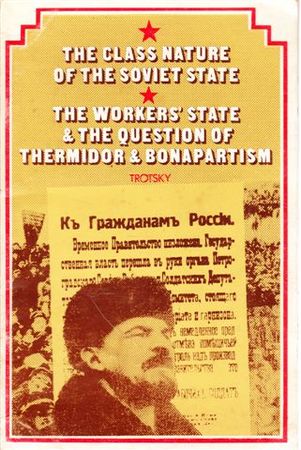Book Review: ‘The Class Nature of the Soviet State/The Workers’ State and the Question of Thermidor and Bonapartism’
Spotted Banner
‘The Class Nature of the Soviet State/The Workers’ State and the Question of Thermidor and Bonapartism’, by Leon Trotsky, New Park Publications (SLL). 4s.
 Whatever Trotsky’s faults he did display a modicum of intelligence and a fine literary style, neither of which could by any stretch of the imagination be attributed to the so-called Socialist Labour League, his latter-day disciples. So their members should be edified by this republication, if no one else.
Whatever Trotsky’s faults he did display a modicum of intelligence and a fine literary style, neither of which could by any stretch of the imagination be attributed to the so-called Socialist Labour League, his latter-day disciples. So their members should be edified by this republication, if no one else.
The friends and the enemies of the Russian Revolution were agreed that it was Socialist. The theory of Russian State Capitalism was a weird eccentricity. Today, any other theory appears curious in the extreme. Thus do men learn from material conditions. When these tracts were written (1933 and 35) Trotsky swam in the backwash of a great social floodtide. Today history has passed him by, consigned him to those same rubbish-cans he reserved for Martov.
“The Soviet state still remains the historical instrument of the working class in so far as it assures the development of economy and culture on the basis of nationalised means of production.” That is the rock bottom of Trotsky’s case, reiterated again and again: nationalisation rules out capitalism. It is a foundation stone which crumbles at a glance into sand.
Marx pointed out that wage labour always entails the bourgeois social relation, capital, and that as long as power over people exists, private property exists. According to different historical circumstances, the capitalist class may own bureaucratically through the state or individually outside the state. For that matter: individually through the state (government bonds) or bureaucratically outside the state (Is the whole salary of a Chairman of the Board the price of his labour power?)
All of this is quite lost on the Trotskyists. “The ruling class, where’s the ruling class?” they mutter, and settle the question to their own satisfaction with the formula: no stocks, no bonds—so no ruling class. Therefore the Russian bureaucracy is not a class but a caste (always in italics: they are necessary to give this feeble label a bogus significance), which makes all the difference when this caste slaughters workers, invades other countries, and lives in luxury on the backs of its starving underlings.
In modern Russia there is no class exploitation, but only social parasitism! Says Trotsky. After making this distinction he innocently refers to its refutation but passes blindly on: “During the middle ages the clergy constituted a class or an estate, insofar as its rule depended upon a specific system of land property and forced labour.” Well, well. So a ruling class needn’t own individually, needn’t be recruited by inheritance, needn’t in fact possess any of the characteristics Trotsky considers so essential to a ruling class when it suits him.
Bureaucratic class rule means that there is private property without private ownership, The bureaucracy owns and its members own through it—not as individuals but by virtue of their office. The Feudal Church is the classic case in Europe. The non-European world, which did not go through the stages of chattel slavery and feudalism, is littered with examples. (See K. A. Wittfogel Oriental Despotism).
An elementary doctrine of Marxism is that of Social Being. we do not assess a society by what it says about itself (in its ideology or laws) but by its actual social relations. In determining the existence of a privileged class we are concerned primarily with the actual class monopoly of the means of production, and only secondarily with legal forms (stocks, shares or state property).
Has Trotsky any stronger arguments? One of them is unanswerable. It hinges on the question how could a socialist revolution evolve gradually into capitalism? How indeed! This poser is certainly an embarrassment to those semi-Trotskyists who persist in the fallacy that there was anything socialist about the October coup. But once you realise that the Russian working-class has never held political power, the question vanishes.
As soon as the Bolsheviks got control they began the process of stamping out every vestige of political democracy. Those who criticised were shot, but also honoured with propaganda broadsides. Lenin’s line was to ridicule them as advocates of “pure abstract” democracy. Using a similar trick, Trotsky, faced with the task of defending a “workers’s state” which “strangles” the workers, attacks those who claim it is not a workers’ state by accusing them of holding “ideal norms.” He is arguing that an animal in every single respect like a fox is in some mysterious magical way really a lamb. All those who point to the foxy fangs, ears and bushy tail are derided as proponents of the “ideal norm” of lambs! Trotsky can only state his case by thus resisting any attempt to introduce the slightest discipline in the matter of definitions.
He reveals his lack of grasp of the basic goal of Socialism when he talks of “the monetary-system which will be very much needed for socialist planning.” In The Revolution Betrayed he actually terms the abolition of wages an anarchist demand! Those poor old anarchists Marx and Engels!
After losing out in a power struggle for the privilege of presiding over the exploitation of millions, Trotsky, this butcher of the working-class, dares to come before the workers of the world offering them what he ludicrously terms “a clear call and an unspotted banner.” Bolshevism and all its offspring are like Bakuninism, Jacobinism and Blanquism, the debris of capitalist revolutions, “revolutions of minorities in the interests of minorities.”
David Ramsay Steele
